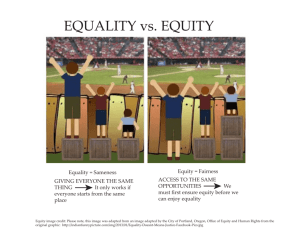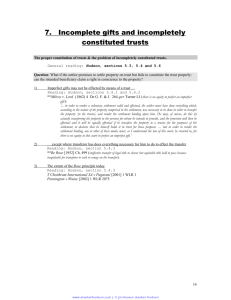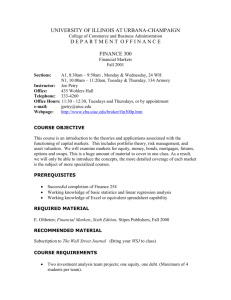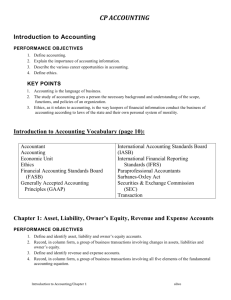Englands Dreaming hand-out
advertisement
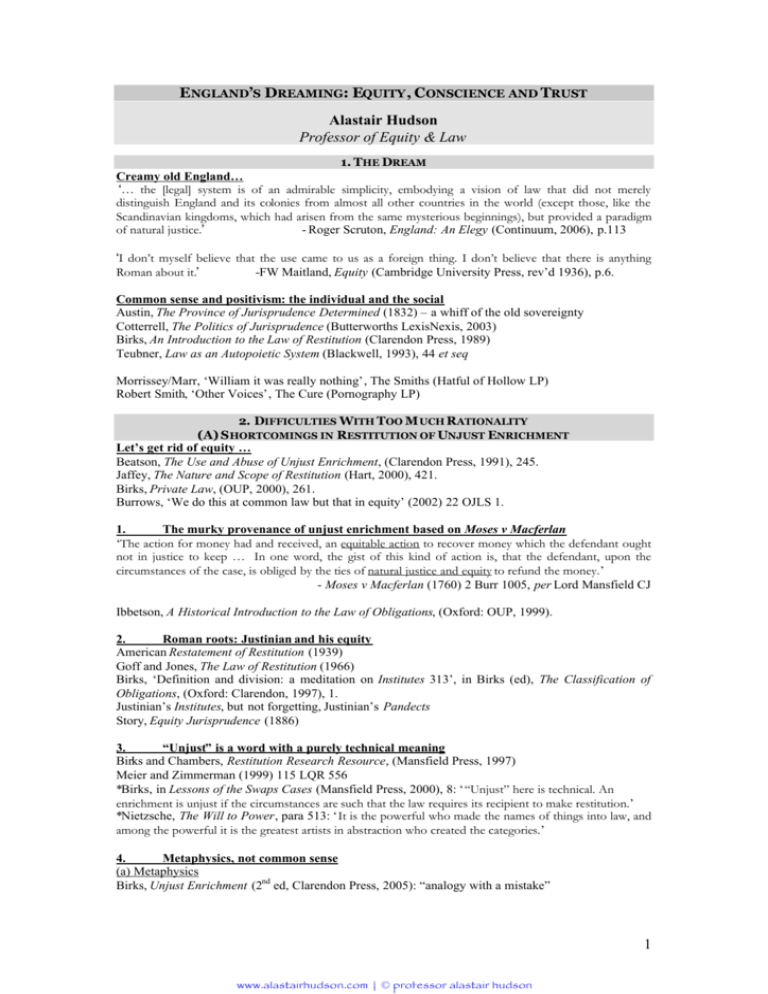
ENGLAND’S DREAMING: EQUITY , C ONSCIENCE AND TRUST Alastair Hudson Professor of Equity & Law 1. THE DREAM Creamy old England… ‘… the [legal] system is of an admirable simplicity, embodying a vision of law that did not merely distinguish England and its colonies from almost all other countries in the world (except those, like the Scandinavian kingdoms, which had arisen from the same mysterious beginnings), but provided a paradigm of natural justice.’ - Roger Scruton, England: An Elegy (Continuum, 2006), p.113 ‘I don’t myself believe that the use came to us as a foreign thing. I don’t believe that there is anything Roman about it.’ -FW Maitland, Equity (Cambridge University Press, rev’d 1936), p.6. Common sense and positivism: the individual and the social Austin, The Province of Jurisprudence Determined (1832) – a whiff of the old sovereignty Cotterrell, The Politics of Jurisprudence (Butterworths LexisNexis, 2003) Birks, An Introduction to the Law of Restitution (Clarendon Press, 1989) Teubner, Law as an Autopoietic System (Blackwell, 1993), 44 et seq Morrissey/Marr, ‘William it was really nothing’, The Smiths (Hatful of Hollow LP) Robert Smith, ‘Other Voices’, The Cure (Pornography LP) 2. DIFFICULTIES WITH TOO M UCH RATIONALITY (A) S HORTCOMINGS IN RESTITUTION OF UNJUST ENRICHMENT Let’s get rid of equity … Beatson, The Use and Abuse of Unjust Enrichment, (Clarendon Press, 1991), 245. Jaffey, The Nature and Scope of Restitution (Hart, 2000), 421. Birks, Private Law, (OUP, 2000), 261. Burrows, ‘We do this at common law but that in equity’ (2002) 22 OJLS 1. 1. The murky provenance of unjust enrichment based on Moses v Macferlan ‘The action for money had and received, an equitable action to recover money which the defendant ought not in justice to keep … In one word, the gist of this kind of action is, that the defendant, upon the circumstances of the case, is obliged by the ties of natural justice and equity to refund the money.’ - Moses v Macferlan (1760) 2 Burr 1005, per Lord Mansfield CJ Ibbetson, A Historical Introduction to the Law of Obligations, (Oxford: OUP, 1999). 2. Roman roots: Justinian and his equity American Restatement of Restitution (1939) Goff and Jones, The Law of Restitution (1966) Birks, ‘Definition and division: a meditation on Institutes 313’, in Birks (ed), The Classification of Obligations, (Oxford: Clarendon, 1997), 1. Justinian’s Institutes, but not forgetting, Justinian’s Pandects Story, Equity Jurisprudence (1886) 3. “Unjust” is a word with a purely technical meaning Birks and Chambers, Restitution Research Resource, (Mansfield Press, 1997) Meier and Zimmerman (1999) 115 LQR 556 *Birks, in Lessons of the Swaps Cases (Mansfield Press, 2000), 8: ‘“Unjust” here is technical. An enrichment is unjust if the circumstances are such that the law requires its recipient to make restitution.’ *Nietzsche, The Will to Power, para 513: ‘It is the powerful who made the names of things into law, and among the powerful it is the greatest artists in abstraction who created the categories.’ 4. Metaphysics, not common sense (a) Metaphysics nd Birks, Unjust Enrichment (2 ed, Clarendon Press, 2005): “analogy with a mistake” 1 www.alastairhudson.com | © professor alastair hudson (b) The retreat from restitution Foskett v McKeown [2001] 1 AC 102 Niru Battery v Milestone [2003] EWCA Civ 1446, Sedley LJ and Clarke LJ National Westminster Bank v Somer [2002] QB 1286 5. Constructive trusts and proprietary estoppel often do what unjust enrichment cannot Birks, An Introduction to the Law of Restitution (Clarendon Press, 1989), 89 Fuller, Legal Fictions (Stanford University Press, 1967) Att-Gen for Hong Kong v. Reid [1994] AC 324 Westdeutsche Landesbank v. Islington LBC [1996] A.C. 669 Royal Brunei Airlines v. Tan [1995] 3 WLR 64 Re Montagu’s Settlements [1987] Ch 264 Baker v. Baker [1993] 25 HLR 408 6. Conscience-thinkers are fascists: the lesson from Reinhard Heydrich Prof Steve Hedley, “The taxonomic approach to restitution”, in AS Hudson ed., New Perspectives on Property, Obligations and Restitution, Cavendish Publishing, 2004. Birks, ‘Equity in the modern law’ (1996) 26 WALR 1: cf. Campbell (1946) 62 LQR 141, 147. (B) BRIGHT-LINE DEVELOPMENT IN LLOYDS B ANK V ROSSET The troublesome notion of common intention Gissing v. Gissing [1971] AC 886; [1970] 3 WLR 255 Lloyds Bank v Rosset [1991] AC 1 Stack v Dowden [2007] UKHL 17, [2007] 2 WLR 831 Cases only concerned with money: the balance sheet cases Springette v. Dafoe (1992) HLR 552; [1992] 2 FLR 388 Huntingford v. Hobbs [1993] 1 FLR 936 Cases concerned to undertake a survey of the whole course of dealing: the family assets cases Hammond v. Mitchell [1991] 1 WLR 1127 Midland Bank v. Cooke [1995] 4 All ER 562 Cases concerned with avoiding unconscionability in general terms Jennings v Rice [2002] EWCA Civ 159, [2003] 1 P&CR 100 Cox v Jones [2004] 3 FCR 693, [2004] EWHC 1486, etc, etc.. Hudson, Equity & Trusts (5e, Routledge-Cavendish, 2007), Ch.15 Cases concerned with fairness and with supplying the common intention Oxley v Hiscock [2004] 2 FLR 669, [2004] Fam Law 569, per Chadwick LJ: ‘… what the court is doing in cases of this nature, is to supply or impute a common intention as to the parties’ respective shares … on the basis of that which, in the light of all the material circumstances (including the acts and conduct of the parties after the acquisition) is shown to be fair …’ Lord Denning, The Due Process of Law (Butterworths, 1980, at p.194): ‘No matter how you may dispute and argue, you cannot alter the fact that women are different from men. The principal task in life of women [sic] is to bear and rear children: and it is a task which occupies the best years of their lives. The man’s part in bringing up the children is no doubt as important as hers, but of necessity he cannot devote so much time to it. He is physically the stronger and she the weaker. He is temperamentally the more aggressive and she the more submissive. It is he who takes the initiative and she who responds. …’ Alastair Hudson, ‘Equity, individualization and social justice’ (in New Perspectives on Property Law, Human Rights and the Home, (London: Cavendish Publishing, 2004), 1). Beck and Beck-Gernsheim, Individualization (Sage, 2002) Social justice and standard deviation: other understandings of these cases David Miller, Social Justice (Oxford University Press, 1976)): rights, deserts, and needs. Hans Magnus Enzenberger, Mediocrity and Delusion, Collected Diversions (Verso, 1992), p.179). Gillett v Holt [2000] 2 All ER 289 Lissimore v Downing [2003] 2 FLR 308 Baker v. Baker [1993] 25 HLR 408 Jennings v Rice [2002] EWCA Civ 159 Wayling v. Jones (1995) 69 P&CR 170 2 www.alastairhudson.com | © professor alastair hudson Re Basham [1987] 1 All ER 405 Hammond v. Mitchell [1991] 1 WLR 1127 Drake v Whipp [1996] 1 FLR 826 ( C) INDIVIDUALISATION The need for respect of the individual ‘“You do not interest me.” No man can say these words to another without committing a cruelty and offending against justice.’ - Simone Weil, 1943, ‘Human Personality’, Simone Weil: An Anthology, 70. Beck and Beck-Gernsheim, Individualization (Sage, 2002) ‘… the very being or legal existence of the woman is suspended during the marriage, or at least is incorporated and consolidated into that of the husband…’ - Blackstone, Commentaries on the Laws of England, 1765, (University of Chicago Press, 1979), p.430. 3. MODERN PROPERTY LAW The unbearable lightness of property ‘The unbearable lightness of property’, in AS Hudson (ed) New Perspectives on Property Law, Obligations and Restitution (Cavendish, 2004), 1. Bauman, Liquid Modernity (Polity Press, 2000) Baudrillard, The System of Objects, 1968 (Verso, 1996); The Consumer Society, 1970 (Sage, 1998) Don King Productions v. Warren [1998] 2 All E.R. 608 Westdeutsche Landesbank v Islington [1996] A.C. 669. Re Goldcorp [1995] 1 A.C. 74 Hunter v. Moss [1994] 1 W.L.R. 452 Bona vacantia: rationality in English property law? Westdeutsche Landesbank v Islington [1996] A.C. 669 Air Jamaica v Charlton [1999] 1 WLR 1399 (+ sovereign commands!) 4. THE LEGAL CONSCIENCE Is it possible to have a “legal conscience”? Aristotle’s Ethics: “For equity, though superior to justice, is still just … justice and equity coincide, and although both are good, equity is superior. … equity is just, but not what is legally just: it is a rectification of legal justice.” Earl of Oxford’s Case (1615) 1 Ch Rep 1, per Lord Ellesmere: “the office of the Chancellor is to correct men’s consciences for frauds, breach of trusts, wrongs and oppressions … and to soften and mollify the extremity of the law” The objectivity of “conscience” in truth ‘Conscience is the aboriginal vicar of Christ.’ - Cardinal Newman ‘But what is this blessed conscience of yours? It is the voice of others inside you.’ - Pirandello, Each in His Own Way, spoken by Diego in Act 1 Hudson, Equity & Trusts (5e, Routledge-Cavendish, 2007), section 32.2. Elias, The Society of Individuals, 1987, (Continuum, 2001). Dishonest assistance and the problem caused by Twinsectra v Yardley Royal Brunei Airlines v. Tan [1995] 2 AC 378, 387, per Lord Nicholls: ‘acting dishonestly, or with a lack of probity, which is synonymous, means simply not acting as an honest person would in the circumstance. This is an objective standard.’ Twinsectra Ltd v. Yardley [2002] 2 All E.R. 377, 387, per Lord Hutton: ‘for liability as an accessory to arise the defendant must himself appreciate that what he was doing was dishonest by the standards of honest and reasonable men.’ Barlow Clowes v Eurotrust [2006] 1 All ER 333, [2006] 1 WLR 1476 Gadamer, Truth and Method (1975, Continuum, 2006). Adorno: ‘a subjectively mediated but objective aesthetics’, ‘Subject-object’, Aesthetic Theory, 2004. 5. EQUITY AND FINANCE Equity out of step with financial law and commercial practice Armitage v. Nurse [1998] Ch 241 3 www.alastairhudson.com | © professor alastair hudson Polly Peck v Nadir (No 2) [1992] 4 All ER 769 FSA Principles for Businesses: “integrity” FSA Conduct of Business Sourcebook; EC Markets in Financial Instruments Directive (“MiFID”) Criminal Justice Act 1988, s93A Money Laundering Regulations 2007 Hudson, The Law of Finance (Sweet & Maxwell, 2009 ) The privatisation of commercial law, and the need for principles and mandatory norms Bankers Trust v Dharmala [1996] CLC 252, Mance J Cowan de Groot Properties Ltd v Eagle Trust plc [1992] 4 All ER 700, 761, per Knox J Manolakaki v Constantinides [2004] EWHC 749 Hudson, Securities Law (Sweet & Maxwell, 2008), para 3-60 et seq. 6. EQUITY AS UNDERSTOOD IN THE OTHER SOCIAL SCIENCES The significance of law in access to justice Foucault, Power/Knowledge, 1991 : ‘the language of power in our Western societies is law, not magic, religion or anything else’. George Orwell, The Lion and the Unicorn – Socialism and the English Genius, (1941), p.44:‘Here one comes upon an all-important English trait: the respect for constitutionalism and legality, the belief in “the law” as something above the State and above the individual, something which is cruel and stupid, of course, but at any rate incorruptible. It is not that anyone imagines the law to be just. Everyone knows that there is one law for the rich and another for the poor. But no one accepts the implications of this, everyone takes it for granted that the law, such as it is, will be respected and feels a sense of outrage when it is not.’ EM Forster, Howard’s End: “a [trust is a ] luxury in which only the wealthy can indulge; the poor cannot afford it.” Lord Woolf, Access to Justice, HMSO, 1996 Housing and homelessness Alastair Hudson, The Law on Homelessness (Sweet & Maxwell, 1997) Pulhofer v. Hillingdon BC [1986] AC 484, Lord Brightman Awua v. Brent LBC [1995] 3 All ER 493, Lord Hoffmann R v. Kensington and Chelsea RLBC, ex p. Ben-el-Mabrouk (1995) 27 HLR 564 R v. Purbeck DC ex p. Cadney [1986] 2 FLR 158 Cheating in planning law Arun DC v First Secretary of State [2007] 1 WLR 523 Rochefoucauld v Boustead [1897] 1 Ch 196 Law as our servant not our master Co-operatives and the use of law Alastair Hudson, The Law on Investment Entities (Sweet & Maxwell, 2000) Roger Cotterrell, Emile Durkheim – law in a moral domain (Edinburgh University Press, 1999) Judges as public servants Alastair Hudson, Towards a Just Society (Pinter, 1999) Labour Party Policy Document, Access to Justice (1995) John Lydon: “There’s no future in England’s dreaming”: The Sex Pistols, ‘God Save the Queen’. Equal access to justice ‘The scourges of social exclusion and the denial of [access to justice] are barriers, not only to opportunities for people, but to the creation of a dynamic and prosperous society. It is simply unacceptable to continue to waste our most precious resource – the extraordinary skills and talents of ordinary people.’ - Rt Hon John Smith QC MP, Foreword to Social Justice – Strategies for National Renewal; The Report of the Commission on Social Justice, (Vintage, 1994). www.alastairhudson.com/englandsdreaming 4 www.alastairhudson.com | © professor alastair hudson 5 www.alastairhudson.com | © professor alastair hudson


